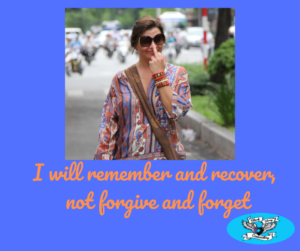To Forgive or Not to Forgive?

Forgiveness is often touted as a necessary requirement to healing. It is included in most religions, is frequently a key component in trauma and recovery programs and is advised by mental health practitioners with almost the same frequency as it is by spiritual leaders. Forgiveness can be a kick-ass freeing experience….but not always.
Much of my clinical practice has me working with victims of relational trauma. Relational trauma (what are known as “small t” traumas) almost always have more enduring adverse effects on people than traumas such as car accidents or natural disasters (“big T” traumas). Because human beings are relational in nature (quite simply, we NEED connection to thrive), being continually hurt, abused, neglected, or betrayed by someone close to us messes us up. Victims of this kind of trauma sometimes are told, or are led to believe, that they are supposed to forgive their perpetrator(s) before they can effectively heal. This is not true, and often causes what is known as ‘secondary wounding’.
Now if someone chooses to embrace forgiveness on their journey to healing, I say Bravo. However, many people who have incurred long-term victimization at the hands of another may feel that their abuser is not deserving of forgiveness. And again: I say Bravo.
Forgiveness is not mandatory for healing. Healing begins when there is a safe space to express and release emotion. While it is not always welcomed societally, anger is always welcome in my work with clients. Anger is an intense reaction to an unmet need. Victims of abuse have endured a whole lot of unmet human needs: needs for acceptance, love, security, safety, ease, nurturance – the list goes on. Anger is a secondary emotion, which means there are emotions such as fear, sadness, isolation, grief, betrayal, shame, and exclusion beneath the anger. These emotions are completely normal to feel and they need to be validated and processed. Rather than move towards “forgiveness” after this stage, many of my clients move towards a letting go process (an “unburdening”), which often gives rise to self-compassion, wisdom hope, resiliency, and what is known in psychotherapy terms as “post-traumatic growth” – this leads to the making of everyday superheroes: people who have overcome adversity and choose to be better and not bitter. Forgiveness not always necessary. ❤
~Christine
For those who strive to come to a place of forgiveness, here are some helpful tips:
- To forgive does NOT mean that you condone wrongdoing
- Reaching a place of true forgiveness is NOT about you deciding that what someone did is okay when clearly is is not
- Forgiving does NOT mean you have to forget (a lofty goal)
- What forgiveness IS: eliminating the negativity that results from hurt by letting go of emotional baggage
